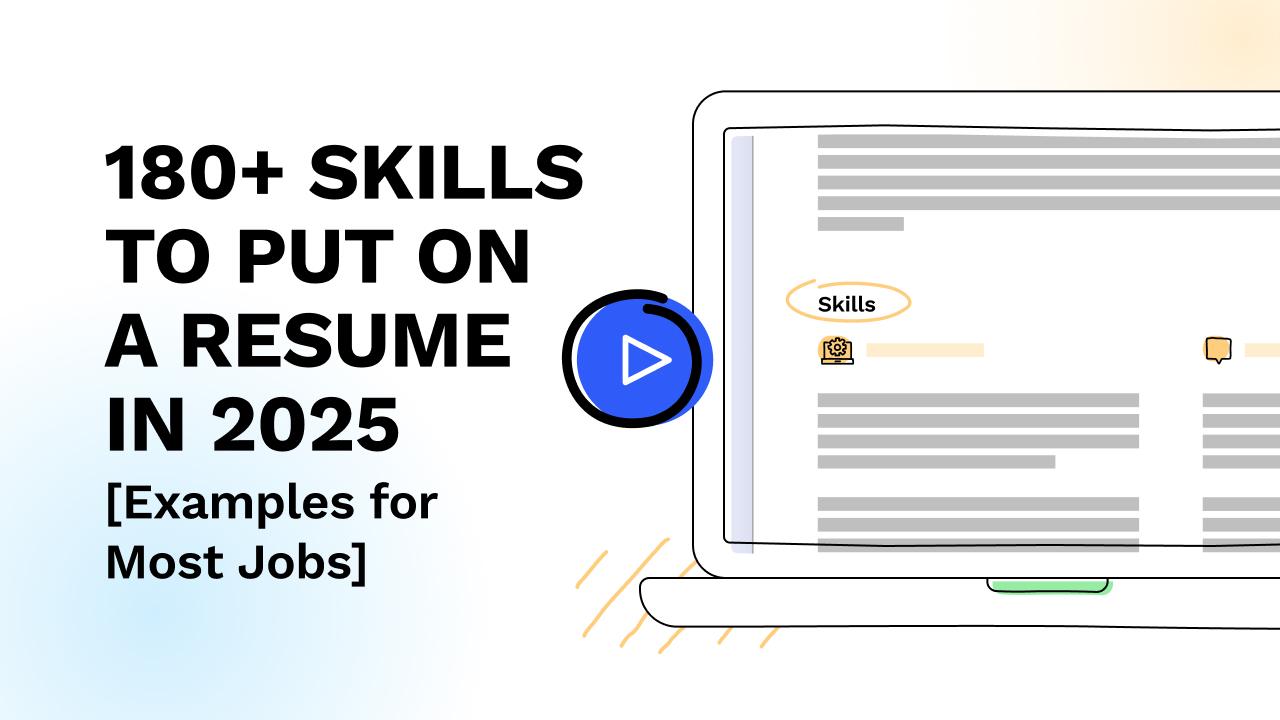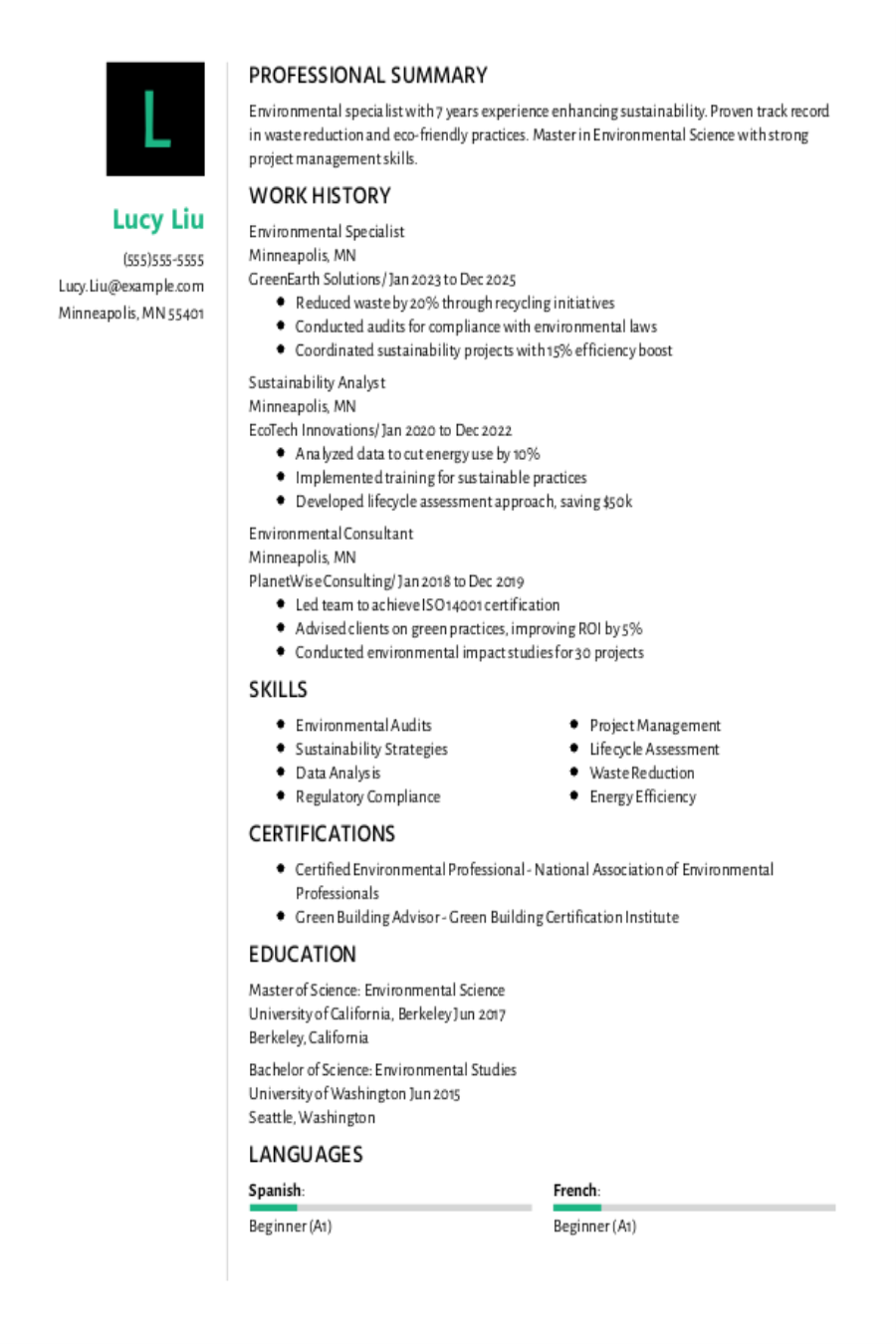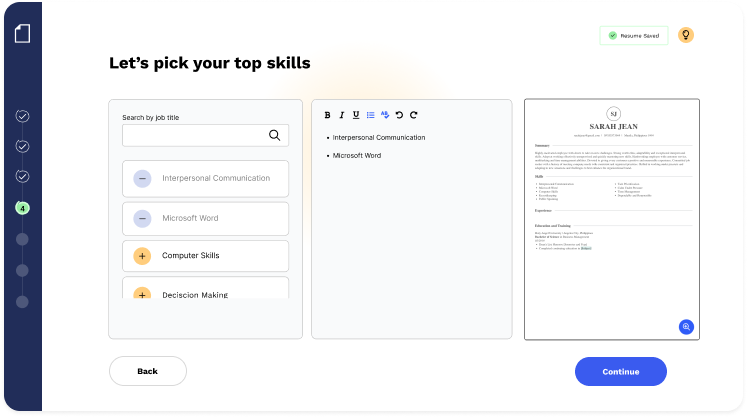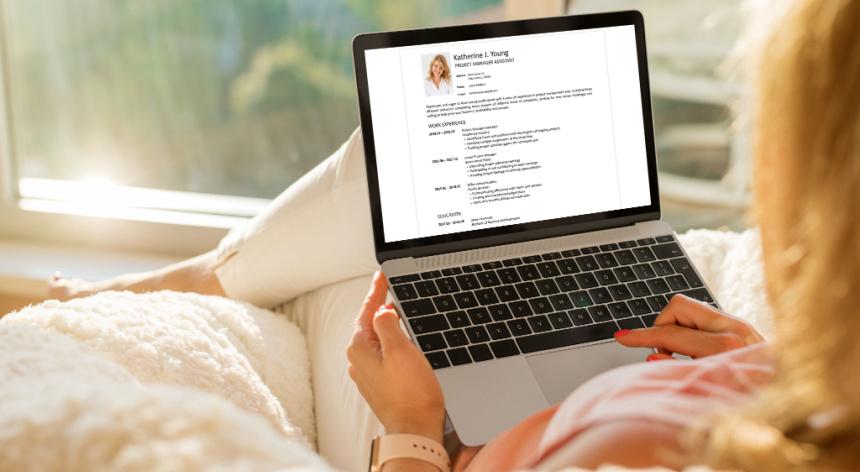Listing skills on your resume can be a game-changer, as long as you choose the right skills for your resume.
It’s not just about listing everything you know. The resume skills you choose to highlight should showcase what you bring to the table while strategically focusing on skills and abilities that are relevant to the specific role.
So, which skills should you put on your resume?
If you want an answer to that question, you’ve come to the right place. Our guide provides tips for choosing the right skills to list on your resume as well as examples of in-demand resume skills that you can put to use today.
This detailed resume skills guide shows you:
- The best skills to list on a resume in 2025
- How to differentiate between soft and hard skills
- A detailed list of industry-specific skills
- How to list skills on a resume to impress recruiters
- Frequently asked questions about writing a resume skills section
Ready to create a resume that showcases your skills? Try our AI Resume Builder. This tool lets you skip the process of coming up with relevant skills by using your experience to create a resume for you in minutes. Customize your resume as much as you want and apply with confidence!

What’s the Difference Between Hard Skills and Soft Skills?
Understanding the difference between hard and soft skills will help you create a balanced and well-rounded resume skills section. When building your resume, you want to include skills from both categories.
Hard skills are technical or job-specific skills learned through education or training. They are tangible and can be tested or measured. Examples include proficiency in a foreign language, computer programming, or operating machinery.
Soft skills, on the other hand, include personal attributes and interpersonal skills. These are much harder to quantify, but are essential for every job. They include qualities like communication, leadership, problem-solving, and adaptability.
Striking a balance between hard and soft skills on your resume presents you as a well-rounded candidate. It shows you not only have the technical capability to perform tasks but also the interpersonal skills to work effectively with others.
Let’s look at a side-by-side comparison of the skill sets:
Skills to Highlight on a Resume
- Foreign language
- Prototyping
- HTML & CSS
- Storyboarding
- Data visualization
- Electronic health records
- Graphics
- App development
- Work ethic
- Flexibility
- Integrity
- Curiosity
- Empathy
- Brainstorming
- Self-motivation
- Mentoring
If you want to go deeper into the distinction between the two, check out our detailed guide on soft skills vs hard skills.
And now that you understand the difference, let’s jump into skills you can add to your resume regardless of your career field.
Top 10 Skills for a Resume In 2025
If you’re wondering, what are some skills to put on a resume? The answer depends on you. Good skills to list on your resume are specific to your background and the role you seek.
The skills on your resume should be targeted to the job you want. If the job requires working with customers, then your resume should mention polite and courteous communication. If the job listing mentions infographics, highlight your ability to interpret data.
While some skills are industry-specific, many are universally in demand. Skills that are widely useful in different jobs are called transferable skills. These skills are extra valuable because they remain helpful and relevant as you shift from role to role.
Here are 10 basic resume skills every job seeker should consider.
1. Leadership skills
Today, in an age of remote work, flexible hours, and virtual teams, inspiring and motivating people is getting harder.
That makes people with good leadership skills even more valuable. Companies need an effective leader who can foster collaboration, communication, and trust across vast geographical distances.
Leadership skills to add to your resume include:
- Strategy
- Motivating others
- Coaching
- Guidance
- Mentorship
2. Communication skills
The globalization and diversification of work, along with the rise in working from home, make communication a critical skill in your 2025 toolbelt.
Whether you find yourself speaking with co-workers on the other side of the world or you need to find the best way to explain a complicated topic, good communication will save you.
Communication skills to add to your resume include:
- Writing
- Relationship-building
- Emotional intelligence
- Persuasion
- Using metaphors
- Cross-cultural communication
3. Teamwork skills
The complexity of the problems faced in the world today can only be solved with meaningful collaboration. Every person brings their own set of valuable skills and experiences to the workplace. When you join forces, that’s when the magic happens.
Teamwork skills to put on your resume include:
- Virtual collaboration
- Active listening
- Consensus-building
- Cultural competency
- Friendliness
4. Problem-solving skills
Every company wants employees who are proactive and focused on solutions. If you can use your resume to show how you’ve solved complex problems for previous employers, you’ll have a leg up over other job seekers.
Problem-solving skills to put on your resume include:
- Systems thinking
- Risk assessment
- Resourcefulness
- Perseverance
- Conflict-resolution
5. Analytical or critical thinking skills
As data comes to drive more and more business decision-making, analytical abilities become more valuable. But there’s more to analysis than data.
Named the No. 1 skill by the World Economic Forum’s Future of Jobs report, analytical thinking can guide relationships, navigate complex cultural scenarios, and help you see things from a different perspective. This skill is foundational for successful job hunters in 2025.
Analytical skills to add to your resume include:
- Constructive criticism
- Cultural intelligence
- Data analysis
- Spreadsheets
- Troubleshooting
6. Management skills
Maintaining a competitive advantage in an era of innovation and disruption isn’t easy. But if you’re a great manager, you can guide your direct reports through treacherous waters.
Management skills show employers that you have what it takes to make tough decisions, mentor others, and achieve results under pressure.
Management skills to add to your resume include:
- Delegation
- Diplomacy
- Mindfulness
- Change management
- Ethics
7. Project management skills
With so many dispersed teams and remote workers, managing projects has changed dramatically in just a few years. Companies truly see the value in someone who can make their lives easier through planning and executing a project effectively.
Project management skills to add to your resume include:
- Agile methodologies
- Digital proficiency
- Software knowledge
- Project scoping
- Scrum
8. Organizational skills
Can you sort digital files like nobody’s business? Do others in the office turn to you for sensible organizing advice? Organizational skills like those listed below are critical to avoiding information overload and burnout and can help you stand out even in a chaotic job market.
Organizational skills to add to your resume include:
- Calendar management
- Recordkeeping
- Multitasking
- Data entry
- Stock inventory
9. Computer skills
There’s no escaping it: computer skills are an essential part of most jobs, and will continue to be important for the rest of your work life. In fact, Coursera’s skills report found that digital skills are the fastest-growing skill set.
Best to devote time to building those skills so you’re ready to roll when the perfect employer comes knocking.
Computer skills to add to your resume include:
- Google Workspace
- Microsoft Office
- Social media
- QuickBooks
10. Presentation skills
Many people say their worst fear is public speaking. If you’re comfortable speaking in front of a group—or at least convincingly pretend to be comfortable—you’ll stand out from the crowd.
Presentation skills to add to your resume include:
- PowerPoint
- Public speaking
- Preparedness
- Confidence
- Physical endurance
Now let’s check out some of the skills required in specific industries.
159 More Skills To Put on a Resume [By Industry]
We’ve covered the skills employers universally desire. But what about those technical skills that are demanded in specific industries? Some say they’re even more critical because they’re often core to the job.
Let’s see which skills to list on your resume in these vital industries:
Don’t see what you’re looking for? Give our AI-powered Skills Section Generator a try. Like our Resume Builder, this tool uses your job title to generate a list of skills in just minutes. But instead of creating a whole resume, this tool lets you hone in on generating a convincing skills section. The best part—it’s totally free to use!
Administrative skills
Being responsible for your own schedule is challenging enough—taking charge of someone else’s is even harder. Here are the skills you should add to your administrative resume:
- Bookkeeping
- Calendar management
- Recordkeeping
- Filing
- Email etiquette
- Receipt management
- Microsoft Outlook
- Google Workspace
- Dropbox
- Meeting minutes
- Event planning
- Videoconferencing
Accounting skills
Accountants use dozens of skills on a daily basis. Some are highly transferable, but many are specific to the industry. These are among the top skills for your accounting resume:
- Generally accepted accounting principles (GAAP)
- Basic math
- Account analysis
- Credit management
- Data entry
- Payroll
- Financial records
- Regulatory compliance and filings
- Tax law
- Accounts payable
- Auditing
- Microsoft Excel
- QuickBooks software
- Risk analysis and forecasting
- Vendor management
Banking skills
Banking is a cornerstone of society. From keeping money secure and processing loans to satisfying customers, banking requires many diverse skills. Here are a few skills to consider putting on your banking resume:
- Government loans
- Deposits
- Withdrawals
- Safety deposit boxes
- Debt management
- IRAs
- Currency exchange
- Mortgage lending
- Mutual funds
- Commercial banking
- Balancing ledgers
- Retail banking
- Transactional banking
Childcare skills
Childcare skills are critical for anyone working with kids, whether you’re a babysitter or overseeing the day-to-day operations of a daycare. Hiring managers will want to know if you can take care of the following:
- CPR/AED certification
- First aid
- Soothing techniques
- Cultural sensitivity
- Emotional awareness
- Endurance
- Meal preparation
- Bottle feeding
- Potty training
- Tutoring
- Lesson plan creation
- Special needs
Customer service skills
Make your job search more successful by adding exemplary skills to your customer service resume. Some of the top contenders include:
- Stress management
- Customer advocacy
- Invoicing
- Conflict resolution
- Typing speed
- Live chat or chatbots
- Self-awareness
- Phone etiquette
Food service skills
Working in kitchens, whether you’re in the fanciest restaurant or a fast food chain, requires much more than ringing up orders and flipping burgers. Here are just a few of the food service skills that would make your resume more appetizing:
- Cooking
- Restocking
- Knife skills
- Food safety
- Mixing drinks
- Reservation systems
- Sanitization
- Bartending
- Waiting tables
- Creating recipes
- Measuring ingredients
- Catering
Graphic design skills
Include these skills on your graphic designer resume when you want to impress employers and stand out from other candidates:
- Brainstorming
- Adobe Creative Suite
- Google Drive
- Typography
- Graphic design software like Figma, Sketch, and Affinity
- Visual hierarchy
- Animation
- UI/UX design
- Color theory
- Freehand
- Print design
- Image copyright laws
Housekeeping skills
If part of your job involves tidying, then the housekeeping skills listed below may apply to you. Housekeeping skills are a great addition to your resume when you’re trying to show a potential employer you can clean pretty much anything.
- Laundry
- Mopping
- Dusting
- Window washing
- Vacuuming
- Sweeping
- Cleaning bathrooms
- Cleaning kitchens
- Infection control
- Chemical handling
- Removing garbage
- Carpet cleaning
- Deep cleaning
Marketing skills
Any marketing professional should have the latest in-demand marketing skills. Consider adding these to your marketing resume when you’re looking for your next job:
- Copywriting
- Social media, including Facebook, X, Instagram, and TikTok
- Storytelling
- Google Analytics
- Research
- Email outreach (e.g., MailChimp or HubSpot)
- Search engine optimization (SEO)
- Search engine marketing (SEM)
- Brand management
- Press releases
- Social media dashboards (e.g., Hootsuite)
- Digital strategy
- Link building
Nursing skills
If you’ve worked in nursing, you know what it’s like to hone your skills under pressure. From showing compassion to patients to communicating with the care team, nurses have an expansive skill set. Consider adding these nursing skills to your nursing resume:
- Patient care
- Preventing infection
- Telemetry
- Nebulizer treatments
- Fall risk assessment
- Specimen collection
- Electronic health record (EHR) proficiency
- Dialysis
- ER care
- Medication regimen
- Nutrition
- Ethics
- Decision-making
- Vital signs
- Clinical documentation
Retail skills
Add these skills to your retail resume to show you can address customer needs and talk fluently about products and services:
- Product knowledge
- Dependability
- Flexibility
- Loyalty programs
- Point-of-sale (POS) systems
- Product displays
- Merchandising
- Advising customers
- Meeting sales goals
- Loss prevention
- Enthusiasm
Sales skills
Sales is more than talking a good game. You must make customers feel heard and appreciated while keeping the business goals in mind. Here are a few skills to add to your sales resume:
- Customer relationship management (CRM) software
- Upselling techniques
- Active listening
- Telesales
- Relationship-building
- Industry knowledge
- Salesforce
- Defining personas
- Cold calling
- Closing sales
- Signing contracts
Warehousing skills
If you work in a warehouse, you’ll need a skills section that communicates your efficiency. Put these skills on your resume to show you are capable of handling inventory:
- Inventory control
- Unloading trucks
- Production speed
- Shipping and receiving
- Tracking
- Supply chains
- Logistics
- Forklift operation
- Packing
- Pallet jack
- Able to lift over 50 pounds
- Quality control
How To List Skills on Your Resume
Now that you have a solid job skills list, you’re ready to add the skills to your resume. But how do you write skills for a resume? It’s easy! The process only takes four steps. Here’s a tried-and-true approach:
STEP 1
Identify critical skills and add them to your resume
If you only take one thing away from this article, it should be this: customize your resume skills for every application to target the job you want. The skills on your resume should always match the skills in the job listing.
How do you align your resume with the job? Read the job description closely. Then highlight or underline every skill in the post.
Take this insurance sales agent job description, for example, to see the skills in bold:
Job duties:
- Develop leads, identify customer needs, schedule appointments, and market appropriate products.
- Present a diversity of solutions to customers using our suite of products and services to help clients identify and achieve their goals.
- Ensure all quotes, procedures, and practices are compliant with state and federal insurance regulations.
- Work independently while meeting deadlines.
- Provide prompt, thorough, and friendly customer service.
Desired skills and experience:
- You possess strong organizational and time management skills.
- You’re capable of building relationships with sales customers.
- You have a successful track record of meeting sales goals.
Minimum requirements:
- High school diploma or GED
- Must pass a background check and be at least 18 years old for a license
- Excellent communication skills
- 2+ years of experience working with clients in a high-pressure sales environment
- Property and Casualty license (currently holding)
After you’ve highlighted skills in the job description, what the employer wants will be more apparent than ever. Now you can begin adding the skills they’re looking for to your resume.
You can list the skills in their own section, plus add them to the resume profile and work history section using action verbs. Doing so strengthens your resume because it shows employers how you have utilized each of the listed skills.
Not only that but you’ll also have a better chance of making it past the applicant tracking system (ATS). An ATS is the software employers use to screen out unqualified applicants. You could end up being blocked for failing to include specific words and phrases.
Adding specific skills will help your resume pass ATS screening, but for additional peace of mind, you may want to try an ATS resume checker. These tools scan your resume just like an ATS software would, then they give you feedback on your resume’s performance. Use this to adjust your choice of skills and ensure your resume is ATS-ready.
STEP 2
Create a dedicated resume skills section
Every resume has a skills section. In this section, you can list the skills most relevant to the job.
When you add skills to this section, keep five things in mind:
- Be succinct. There’s no established number of skills to include in the skills section of a resume, but since you have limited space to work with, aim for no more than 10.
- Be specific. Include pertinent details, such as adding “verbal and written communication” instead of simply “communication.”
- Choose wisely. You have limited space to work with, so aim for maximum impact by being honest about your marketable strengths, matching them closely to the job, and only adding the best of the bunch.
- Consider using subsections. Depending on the layout of your resume, you can differentiate and organize your skills into one list of crucial skills or divide your skills into two lists.
- Use bullet points. Using bullet points will not only help you keep your skills section short but also make it easy for recruiters and hiring managers to scan for relevancy.
Here’s an example of a skills section on a resume:
Computer skills
- Microsoft Office
- HTML & CSS
- JavaScript
- Python
- Social media
Soft skills
- Strong communication
- Creative problem-solving
- Effective critical thinking
- Highly self-motivated
Now, here are several mistakes you should avoid when writing your skills section:
- DON’T add basic skills that are not required for the job, such as email or Microsoft Word.
- DON’T use skills you hope to gain or are learning. You don’t get points, for example, for dipping into JavaScript if you’ve only read a book about it.
- DON’T consider irrelevant technology such as a fax machine or outdated software.
- DON’T include languages you studied but don’t speak or write with at least some fluency.
- DON’T play with buzzwords such as “hard worker,” “team player,” “go-getter,” or “bottom line.”
Finally, if you need more guidance, check out some resume templates to see how skills sections vary in different resume styles. For advice on the best resume template for your role, use our guide to the best resume templates for 2025.
Pro tip: The type of resume skills section you use will depend on your resume format. Chronological resumes, for example, focus on work history and only have one section dedicated to skills. Functional resumes are much more skills-focused and have as many as two to three skills sections. Combination resumes balance skills and work experience.
STEP 3
Add work-related skills to the experience section
Listing your skills is great, but to make your candidacy more appealing, you need to demonstrate how you’ve applied those skills in previous jobs.
The best way to showcase the skills you’ve honed in the workplace is to write strong bullet points in your work experience section. The work history section of your resume should be brimming with skills and accomplishments.
Each bullet point should include at least one relevant skill plus a quantifiable achievement to show that you achieved results. Hard numbers speak for themselves.
Here’s an example taken from the resume of an applicant interested in the insurance job mentioned earlier (skills are in bold):
Sales Agent
Safe Harbor Insurance, Detroit, MI
08/2019 – Current
- Developed 100+ new leads, driving sales by 35% by marketing appropriate products.
- Ensured all quotes were compliant with state insurance regulations, lowering our rate of incidents to zero.
- Created new strategies for targeting existing leads, exceeding sales goals over six consecutive quarters.
As the example illustrates, every bullet point shows the results of having a skilled employee. This candidate not only “develops leads,” they “drive sales by 35%.” Language like this connects to the employer’s bottom line.
If insurance sales isn’t your arena, there are hundreds of additional work bullet points to sample in our libraries of resume examples and CV examples. Feel free to copy, paste, and customize them to meet your needs.
STEP 4
Include your most essential skills in your professional summary or resume objective
The final place to highlight your skills is in your resume profile—the career summary near the top of your resume. Since this is a prominent position, you’ll want to mention the overarching skills that define your career.
Here are two different approaches to the career profile. The first is a professional summary, which should encapsulate your career highlights in three to four sentences.
Here’s an example of an auto mechanic who recently finished school (skills are in bold):
Newly licensed, ASE-certified automobile mechanic with experience working in a fast-paced shop. Quick learner with a friendly personality who likes to work with customers as much as on cars. Can perform diagnostics and repairs on all makes and models of domestic and imported cars and trucks.
The second approach is to write a resume objective, where you can showcase your intentions by stating precisely what you are seeking. While an objective functions a bit differently than a career summary, they both advertise skills in a similar way.
Here’s an example of a sales associate looking for a management position (skills in bold):
Personable store associate with eight years of experience in retail sales and customer service seeking a management role in Best Buy’s home entertainment department. Committed to creating a welcoming atmosphere and delivering memorable experiences, and using advanced knowledge in consumer electronics and upselling techniques to drive sales and customer satisfaction.
Key Takeaways
Skills are more important than ever
Having an impressive variety of skills will help you move between jobs more easily and find a great position.
There are many different types of skills
From hard, technical skills to soft, interpersonal skills, every job requires a mix of these two distinct skill sets.
Skills should be included throughout your resume
Showcasing the skills on your resume by listing them in your skills section and integrating them throughout your resume profile and work experience is critical.
Customize your resume for the job you want
Always tailor your resume based on the job description to sail past the ATS and show you truly understand the job.
Resume Skills FAQ
The five skill levels refer to your level of proficiency with a particular skill on a resume. Mentioning your skill level helps potential employers understand how comfortable you are applying the skills you list.
Here are the five skill levels you might add to your resume:
Novice: This level indicates you are new to a skill and have little to no experience or knowledge in it.
Beginner: This designation indicates to employers that you’ve used the skill but will require guidance and instruction to perform it effectively.
Intermediate: This proficiency means you have a good grasp of the basic functions of a skill and can do some or most related tasks independently. However, at this level you’ll still require assistance for more advanced tasks or complex issues.
Advanced: This designation indicates to employers that you have significant expertise and experience with the skill, can work independently with minimal supervision, and are able to teach others how to use the skill.
Expert: This category is reserved for individuals with a deep understanding of and experience with a particular skill. An expert would be considered a specialist and would often be the authority on the use of the skill in question because they understand the minute details of using the skill and can solve the most complex problems that might arise.
Which skills you put on your resume will vary depending on the position you’re applying for. You can get a sense of the best skills by reading the job listing. You should always read the description closely, take note of the skills required for the job, and add those skills strategically on your resume.
There’s no single answer to this question because every job has different tasks requiring different skill sets. However, some skills are more unique than others. For example, common skills that are easily transferable between jobs include communication, leadership, public speaking, creativity, and teamwork.
Unique skills, on the other hand, are particular to the position. For example, mechanical engineers must know how to create computer-aided designs (CAD) using specific programs like SOLIDWORKS. These aren’t skills you’ll find in many other professions.
Like you would on a resume, the best way to describe your skills in a job interview is to use examples from your past. For each critical skill you listed, jot down two to three examples of a time when you used those skills to solve a problem or innovate a process. This will help you feel prepared to answer the interview questions that you may be asked—plus, using concrete examples allows the interviewer to understand in real terms what you will bring to the table if you are hired and how your unique skill set might contribute to the goals of the organization.
The best skills to put on your resume would be the skills that appear in the job description. For example, if the job description lists teamwork skills, your resume should include that keyword—so long as you’re proficient in the skill, of course.
In general, top resume skills include:
- Leadership
- Communication
- Problem-solving
- Computer proficiency
- Relationship-building
- People skills
- Emotional intelligence
- Teamwork
- Flexibility
Employers want all job applicants to have a combination of soft skills and hard skills, so aim for a mix of both. You want to show that you have at least some knowledge of the tools needed for the job. Also, the more skills you show (with honesty!), the better your chance of standing out from other applicants. Transferable skills like verbal and written communication, active listening, problem-solving, and multitasking are valued across multiple industries and job titles, so add them if you’ve got them!
Some of the most valued job skills in 2025 include:
- Time management. The broad acceptance of remote work has made this a sought-after skill in 2025.
- Collaboration skills. Essential for most team-oriented jobs, especially during the age of virtual meetings.
- Resilience. If recent events have taught us anything, it’s that resilience is highly valued. Employers in 2025 want to know you can handle anything with composure.
- Adaptability. An essential skill for employers in 2025. Let hiring managers know you can accept change, learn new technology, and thrive in a post-pandemic world.
- Emotional intelligence. Hiring managers in 2025 prefer employees who can acknowledge and stay in tune with their own and others’ emotions. A little compassion goes a long way.
You list your skills on your resume by following a few simple steps:
- Read the job description closely, underlining the skills.
- Put skills throughout your work experience section.
- Create a skills section so you can mention additional skills.
- Insert the most critical skills into your professional summary or resume objective.
Rather than describe your skills level on a resume, add only skills you can perform proficiently as long as they match the job. Hiring managers only want to know about those skills, and you can discuss them more in-depth if you get an interview.
Your resume isn’t the only avenue you have for showcasing your skill set. Writing a strong cover letter gives you the opportunity to elaborate on your skills and provide concrete examples of how you have used them to generate positive results.
Use our guide to learn how to write a cover letter, or consider using our Cover Letter Generator to get the job done in a matter of minutes. Our builder offers professionally designed cover letter templates and section-by-section text suggestions to ensure your cover letter is well-written and full of the critical skills employers look for in top applicants.
Was this information about 180+ Skills To Put On A Resume [Examples For Most Jobs] helpful? Let us know!
Don is a Certified Professional Resume Writer (CPRW) with more than 10 years’ experience creating digital content, including four years helping job seekers develop their careers. He holds an M.S. in Journalism from Northwestern University.
More resources

How to Use Resume Now’s Resume Builder for Free
Try Resume Now s AI-powered Resume Builder for free to access ...

How to Include Networking Skills on a Resume (40+ Examples, Definition & Tips to Improve)
What are networking skills? We ll answer this and all your p...

Education Resume: Examples & Templates
Build & download your Education resume in a few simple steps. ...

Environmental Resume: Examples & Templates
Build & download your Environmental resume in a few simple ste...




